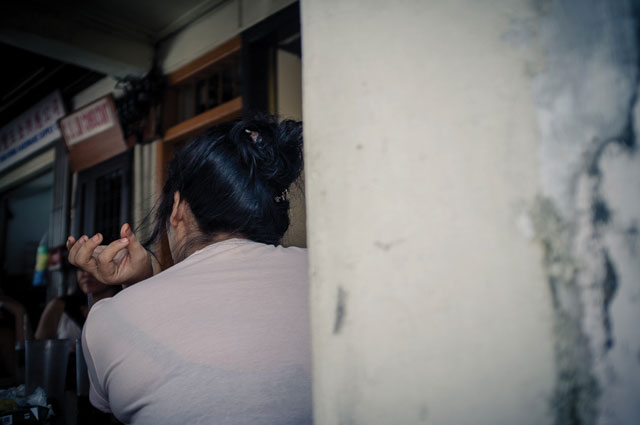Once a week, Project X, a small and underfunded group that advocates for sex workers’ rights, meets at a coffee shop in one of Singapore’s red light districts. Volunteers sit at a table littered with plates of prata and tom yum bee hoon, making little parcels out of condoms, wet wipes and lubricant. Later on, volunteers will hand out these packages to the women who operate in the area.
Different areas of Singapore are often home to different types of sex workers. In this particular red light district, not far from the centre of the island, transgender sex workers can be found in unlicensed brothels, looking out to the street from behind padlocked metal gates. Prospective customers cluster around the locked entrances, peering past the bars and grilles to the women who sit behind them. Occasionally a worker will spot a favoured customer and wave to them. Mostly, though, they ignore the men until one of them indicates an interest and a price is agreed. The gate is unlocked and pulled open just long enough for him to enter.
Despite the best efforts of organisations such as Project X and others around the world, sex work continues to attract judgement and prejudice. Transgender women are particularly vulnerable to discrimination in their everyday lives, making them more likely to take up sex work. “Some transgenders don’t even have PSLE [primary school certificates] because they were expelled or pressured to leave,” says Vanessa Ho, coordinator of Project X. “Some are kicked out by their family and end up in sex work because the money is better than working in places such as McDonalds.”
As with many prospective careers, the promise of hard cash can be a significant pull. Tiffany has been a sex worker for ten years. “At first it was just playing – playing only,” she says. “Then I saw the money. Fast cash. See money, then OK, I want to do this job.”
However, women remain cautious about publicising their participation in the industry. Anonymity is still a major issue when appearing in the media, which is why the names of all the workers have been changed in this story. Family life and perceptions remain of the utmost importance, and there are radically different stories of how parents deal with their transgender daughters.

Nadia looks young for her age and cools herself incessantly using a small folding fan. She grew up in a Malay Malaysian family but earns a good income in Singapore as a sex worker. Recognised as the “older sister” of many other transgender sex workers, she often speaks for all the women at the table.
“Last Father’s Day they asked me when it would be my turn – when I would become a father.”
Nadia
“I was scolded by my father and mother,” she recalls of the time she started dressing as a woman. “I was beaten by my four brothers because I had slight boobs from hormone pills. Even now they still can’t accept who I am. Last Father’s Day they asked me when it would be my turn – when I would become a father.”
Tiffany, a young Singaporean Malay with straight black hair and a thick layer of make-up, had a different experience. She underwent a sex change operation and changed her identity card from male to female when she was 22 years old. “I said: ‘Mum, I’ve changed already. I have to change. I have to be myself.’ She’s OK. She cried but now she’s OK. Now they accept me. All my family members are supportive. Even my niece, my nephew – they’re all OK,” she says.
Neither Nadia nor Tiffany have told their family that they’re sex workers, choosing instead to say that they’re working as showgirls. “I think that only one out of 100 families would accept that,” says Nadia.
Tiffany joins us for dinner one night. It’s too hot and she can’t be bothered to go to work, she says. We eat fried noodles and talk about the new X-Men movie, local 1990s soap operas and some gossip about others on the street – one worker had recently been caught stealing her colleagues’ money. Her impromptu night off is testament to her confidence in her earnings, because she has multiple expenses to cover. The room in the brothel she works in costs SGD60 ($48) a night, a cost she has to pay regardless of whether she works or not. She also pays SGD600 ($480) a month to rent a room to live in. This means she has to earn more than SGD2,400 ($1,920) a month before she makes any profit for herself.
The industry has evolved over the years. Many workers say that the police are patrolling the area more strictly now – previously the relationship between workers and law enforcement was more relaxed. The workers’ asking price has also dropped. When Tiffany first started working ten years ago, the standard price in the area was SGD50 ($40) for “standard” service – often oral sex. It has now dropped to between SGD20 ($16) and SGD30 ($24), a circumstance the workers often blame on the influx of women from Vietnam and China who are willing to settle for lower fees.

This doesn’t mean that there aren’t opportunities to earn a good income. Annie has been a sex worker since the 1980s and knows the area well, even though she doesn’t work here any more. “Here, it’s blue-collar customers. It’s about volume,” she explains. “Each customer only takes about five to ten minutes.” A busy night could see a popular worker – known among her colleagues as an “ong queen” – earning SGD1,000 ($800) to SGD2,000 ($1,600). A worker told us she once had 97 customers in a single night.
A worker told us she once had 97 customers in a single night.
Some women earn extra cash by advertising escort services online. Tiffany, for example, charges SGD350 ($280) for 90 minutes. Annie, now working exclusively through online postings, charges SGD150 ($120) to SGD250 ($200).
Although brothels are technically illegal, there is an unofficial agreement between the women and the police: Business is allowed as long as rules are obeyed. One of these rules involves shutting the brothel doors whenever a police patrol goes by. Another is staying away from certain areas, such as Clarke Quay, an entertainment district popular with tourists.
However, Project X has documented various workers’ run-ins with the police. Ho cites cases where police officers have searched workers and threatened to arrest them upon finding condoms in their bag. A worker arrested for soliciting can be held in custody for up to 48 hours. Such actions often pass by unnoticed and unreported.
Customers also have varying levels of acceptance of transgender women. “Men are interested in us,” says Farah, a Malaysian sex worker who works in a brothel with more than ten women waiting behind the gate. “Sometimes their wives cannot do what we can.”
Yet things do not always run smoothly when certain men realise that they’ve paid for the services of a transgender woman. “I once got my clothes thrown out of the room,” says Annie, a straight-talking Singaporean sex worker. Sometimes workers have to return the money to avoid trouble from an upset client.
Thankfully for the girls, problematic customers – colloquially known as “cheebye customers” – can usually be avoided. Sitting behind a gate while men look on might seem objectifying, but most workers say that it makes them feel safe. “We don’t let drunken people in because we don’t want trouble,” explains Farah.
Sitting by her side, Farah’s “older sister” Nadia nods. “We try to avoid fighting [with customers],” she says. “If they come in and they make trouble we return the money and make them go.”
Despite the efforts of organisations such as Project X, labour rights and other freedoms remain a long way off for Singapore’s sex workers, transgender or otherwise. Brothels offer little protection so, for now, the workers rely on each other the best they can. Young workers befriend “senior sisters”, learning from their experiences and soaking up their advice. In this way, the industry putters along with its own ecology; a sisterhood of cooperation and competition, friendships and rivalries.”


